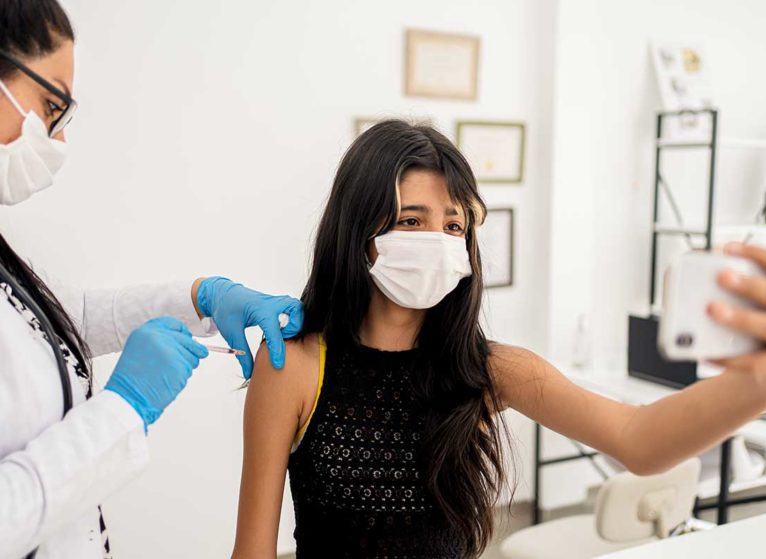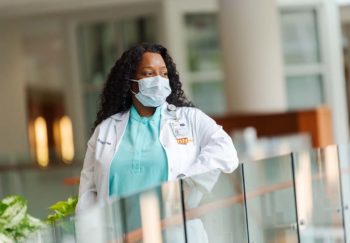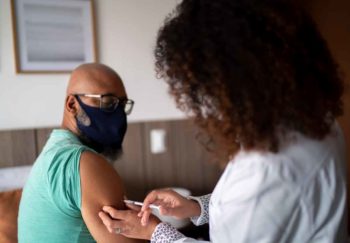COVID AT UVA HEALTH: BY THE NUMBERS
- 118 patients, including 7 children, were hospitalized at UVA Health with COVID
- See Virginia-wide stats from the Virginia Department of Health
WHAT YOU NEED TO KNOW NOW: KIDS & COVID
With rapid spread of the omicron variant, the number of kids infected with COVID-19 continues to rise. However, the overall risk for children developing serious illness due to COVID-19 remains low, according to infectious diseases expert Bill Petri, MD. “Children are at much less risk than adults for moderate to severe COVID-19,” he says. “Even with omicron, this is the case — less than 1% of all COVID hospitalizations are children.”
Of course, there’s a lot we still don’t know about COVID, particularly when it comes to the long-term effects of infection in both kids and adults. This is why it’s so important to continue doing everything we can to prevent the spread of the virus.
Get the Booster: Kids 12 Years & Up Now Eligible for Third Shot
The Centers for Disease Control and Prevention expanded its recommendations for the COVID booster to include kids age 12 to 17 years old. This means everyone over age 12 who received 2 doses of the vaccine can get the Pfizer-BioNTech booster 5 months after their second shot.
How to Protect Kids Too Young for Vaccination
Kids age 4 years old and younger still can't get the COVID vaccine. Unfortunately, this puts them at higher risk than vaccinated kids of being hospitalized with complications of the virus. Petri urges families with small children not to let their guard down.
Keep taking these necessary steps to protect your young kids:
- Vaccinate everyone in the family 5 years of age and older
- Get everyone 12 years of age and older boosted when eligible
- Wear masks — everyone 2 years and older should wear a well-fitting mask in public indoor spaces
- Isolate family members for at least 5 days who have come down with COVID-19
- Quarantine nonvaccinated family members who were exposed to someone with COVID for 5 days
- Stay “socially distant,” 6 feet or more, away from others
- Wash hands frequently
“Doing all of these things will place a zone of safety around your child who cannot yet be vaccinated,” says Petri.
NATURAL IMMUNITY IS GOOD — VACCINATION IS BETTER
Even if you’ve had COVID-19, vaccination is still your best protection from complications from a repeat infection. “What we know from other variants is that a previous infection does provide some level of immunity,” says infectious disease specialist Costi Sifri, MD. “But getting the vaccine after you’ve recovered from COVID-19 infection will provide the best immune response. A booster will increase protection even further.”
Sifri adds that the CDC recommends waiting at least 10 days after you’ve recovered from COVID — with no fever or other symptoms — before receiving the vaccine or the booster.
POSITIVE COVID TEST? HOW TO ISOLATE
If you test positive for COVID, you should isolate for 5 days, says Sifri. Remain in isolation until your symptoms have improved or have resolved, with no fever for at least 24 hours without the use of fever-reducing medications. After isolating for at least 5 days, be sure to wear a well-fitted, high-quality mask at all times when in public through at least the 10th day after infection.
WHAT WE DON’T KNOW: WILL THERE BE NEW, VACCINE-RESISTANT VARIANTS?
According to Sifri, it’s likely we will continue to see new COVID variants. However, he says, it’s difficult to predict what drives the emergence of new variants. Also unknown: How those variants will affect those who are vaccinated compared to those who are unvaccinated.
“On the back side of omicron, when it’s likely that most people will have been infected or vaccinated or both, it remains to be seen how this will play out. Will this virus evolve to become more or less virulent? We just don’t know,” he says. “We do feel that vaccination remains the best protection. And we have to be on guard, as we may see differences in variants of the future.”
STRUGGLING WITH COVID SYMPTOMS?
If you're at high risk for COVID complications, you may be eligible for monoclonal antibody treatment.
THE BOTTOM LINE
We’re not out of the woods yet. COVID cases have yet to peak in much of the U.S., with approximately 780,000 new cases reported daily, according to the CDC. The effects of the omicron variant seem milder than previous variants. But it can still lead to serious illness for people at high risk. That includes young children, those with compromised immune systems or other health problems, and the unvaccinated. The best way to protect yourself, your family, and your community is to get vaccinated.


